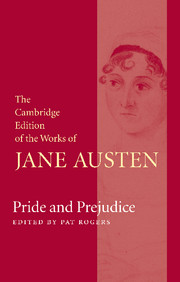Book contents
- Frontmatter
- Contents
- General Editor’s Preface
- Acknowledgements
- Chronology
- Introduction
- Note on the Text
- Pride and Prejudice
- Pride and Prejudice: Volume I
- Pride and Prejudice: Volume II
- Pride and Prejudice: Volume III
- Corrections and Emendations to 1813 text
- Appendix 1 Thomas Egerton and the Publication History
- Appendix 2 Legal and Military Background
- Appendix 3 Pemberley and its Models
- Appendix 4 Note on the second and third editions of Pride and Prejudice
- Abbreviations
- Explanatory Notes
Chapter 19
Published online by Cambridge University Press: 19 December 2020
- Frontmatter
- Contents
- General Editor’s Preface
- Acknowledgements
- Chronology
- Introduction
- Note on the Text
- Pride and Prejudice
- Pride and Prejudice: Volume I
- Pride and Prejudice: Volume II
- Pride and Prejudice: Volume III
- Corrections and Emendations to 1813 text
- Appendix 1 Thomas Egerton and the Publication History
- Appendix 2 Legal and Military Background
- Appendix 3 Pemberley and its Models
- Appendix 4 Note on the second and third editions of Pride and Prejudice
- Abbreviations
- Explanatory Notes
Summary
THE Next day opened a new scene at Longbourn. Mr. Collins made his declaration in form. Having resolved to do it without loss of time, as his leave of absence extended only to the following Saturday, and having no feelings of diffidence to make it distressing to himself even at the moment, he set about it in a very orderly manner, with all the observances which he supposed a regular part of the business. On finding Mrs. Bennet, Elizabeth, and one of the younger girls together, soon after breakfast, he addressed the mother in these words,
“May I hope, Madam, for your interest with your fair daughter Elizabeth, when I solicit for the honour of a private audience with her in the course of this morning?”
Before Elizabeth had time for any thing but a blush of surprise, Mrs. Bennet instantly answered,
“Oh dear!—Yes—certainly.—I am sure Lizzy will be very happy—I am sure she can have no objection.—Come, Kitty, I want you up stairs.” And gathering her work together, she was hastening away, when Elizabeth called out,
“Dear Ma’am, do not go.—I beg you will not go.—Mr. Collins must excuse me.—He can have nothing to say to me that any body need not hear. I am going away myself.”
“No, no, nonsense, Lizzy.—I desire you will stay where you are.”—And upon Elizabeth's seeming really, with vexed and embarrassed looks, about to escape, she added, “Lizzy, I insist upon your staying and hearing Mr. Collins.”
Elizabeth would not oppose such an injunction—and a moment's consideration making her also sensible that it would be wisest to get it over as soon and as quietly as possible, she sat down again, and tried to conceal by incessant employment the feelings which were divided between distress and diversion. Mrs. Bennet and Kitty walked off, and as soon as they were gone Mr. Collins began.
“Believe me, my dear Miss Elizabeth, that your modesty, so far from doing you any disservice, rather adds to your other perfections. You would have been less amiable in my eyes had there not been this little unwillingness; but allow me to assure you that I have your respected mother's permission for this address.
- Type
- Chapter
- Information
- Pride and Prejudice , pp. 117 - 122Publisher: Cambridge University PressPrint publication year: 2006

